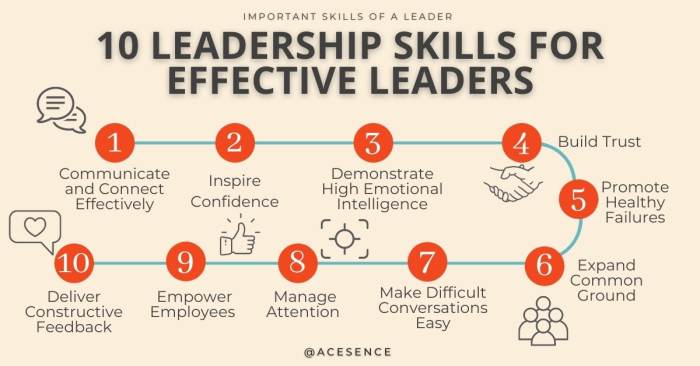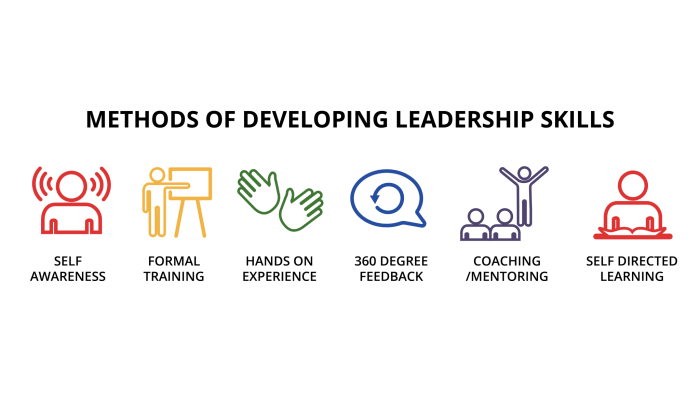Developing Leadership Skills sets the stage for this enthralling narrative, offering readers a glimpse into a story that is rich in detail with american high school hip style and brimming with originality from the outset.
Leadership skills are crucial for personal and professional growth, encompassing communication, decision-making, and emotional intelligence. This guide will equip you with the tools to enhance these skills and become a dynamic leader in any setting.
Understanding Leadership Skills

Leadership skills are the abilities and qualities that enable an individual to guide, motivate, and inspire others towards a common goal or vision.
Developing leadership skills is crucial for both personal and professional growth as it enhances decision-making, communication, and problem-solving abilities. It also fosters teamwork, boosts confidence, and improves overall effectiveness in various settings.
Types of Leadership Skills
There are several types of leadership skills that are essential for effective leadership:
- Communication: The ability to clearly convey ideas, listen actively, and provide feedback to team members.
- Decision-making: Making sound and timely decisions based on available information and critical analysis.
- Emotional Intelligence: Understanding and managing one’s emotions, as well as empathizing with others to build strong relationships.
- Adaptability: Being flexible and open to change, able to adjust strategies and plans as needed.
- Visionary Thinking: Having a long-term perspective and the ability to inspire others with a compelling vision for the future.
Methods for Developing Leadership Skills
Developing leadership skills is essential for success in various aspects of life. It requires continuous learning, practice, and self-reflection. Below are some effective methods to enhance leadership skills:
Improving Communication Skills
Effective communication is crucial for a leader to convey ideas, inspire others, and build strong relationships. Here are some strategies to improve communication skills:
- Active listening: Pay attention to others’ perspectives and show empathy.
- Clear and concise messaging: Communicate ideas in a straightforward manner.
- Feedback seeking: Encourage open feedback to understand strengths and areas for improvement.
Enhancing Decision-Making Abilities
Decision-making is a key aspect of leadership. Here are some exercises and activities to enhance decision-making abilities:
- Case studies: Analyze real-life scenarios to practice making informed decisions.
- Role-playing: Simulate decision-making situations to develop critical thinking skills.
- Debates: Engage in discussions to consider different viewpoints and make sound decisions.
Role of Mentorship
Mentorship plays a vital role in developing leadership skills. Here’s how mentorship can help aspiring leaders:
- Guidance: Mentors provide valuable insights and advice based on their experiences.
- Support: Mentors offer encouragement and constructive feedback to foster growth.
- Networking: Mentors can introduce mentees to valuable connections in their field.
Leadership Development Programs
Leadership development programs are essential for individuals looking to enhance their leadership skills and excel in their professional careers. These programs offer a structured approach to developing key leadership qualities and provide opportunities for personal growth and advancement.
Types of Leadership Programs
- Online Courses: Online leadership programs offer flexibility and convenience for individuals who may not have the time to attend in-person sessions. These courses cover a wide range of leadership topics and can be completed at your own pace.
- Workshops: Leadership workshops provide hands-on training and interactive sessions to help participants practice their leadership skills in a real-world setting. These workshops often focus on specific leadership areas such as communication, decision-making, and team building.
- Seminars: Leadership seminars bring together experts in the field to share their knowledge and insights on leadership trends and best practices. Participants can learn from industry leaders and gain valuable perspectives on effective leadership strategies.
Benefits of Enrolling in Leadership Programs
- Enhanced Communication Skills: Leadership programs help individuals improve their communication abilities, including active listening, conflict resolution, and public speaking.
- Effective Decision-Making: Through leadership programs, participants develop critical thinking skills and learn how to make informed decisions under pressure.
- Team Building: Leadership programs emphasize the importance of teamwork and collaboration, teaching participants how to motivate and inspire their team members.
- Strategic Planning: Participants in leadership programs learn how to set goals, create action plans, and execute strategies to achieve success in their roles.
Real-world Applications of Leadership Skills: Developing Leadership Skills

Leadership skills play a crucial role in various industries, including business, healthcare, and education. Individuals who possess strong leadership qualities are able to guide teams towards success, handle challenging situations effectively, and foster a culture of collaboration and innovation.
Business Industry
In the business industry, leadership skills are essential for driving growth, making strategic decisions, and managing teams. Successful business leaders inspire their employees, set clear goals, and create a positive work environment that encourages creativity and productivity.
Healthcare Sector
Effective leadership in the healthcare sector is crucial for ensuring patient safety, improving quality of care, and managing complex operations. Healthcare leaders need to demonstrate empathy, strong communication skills, and the ability to make quick decisions in high-pressure situations.
Education Field, Developing Leadership Skills
In the education field, strong leadership skills are vital for creating a positive learning environment, motivating students, and supporting teachers. School leaders who exhibit visionary leadership, effective communication, and a focus on continuous improvement can drive academic excellence and student success.